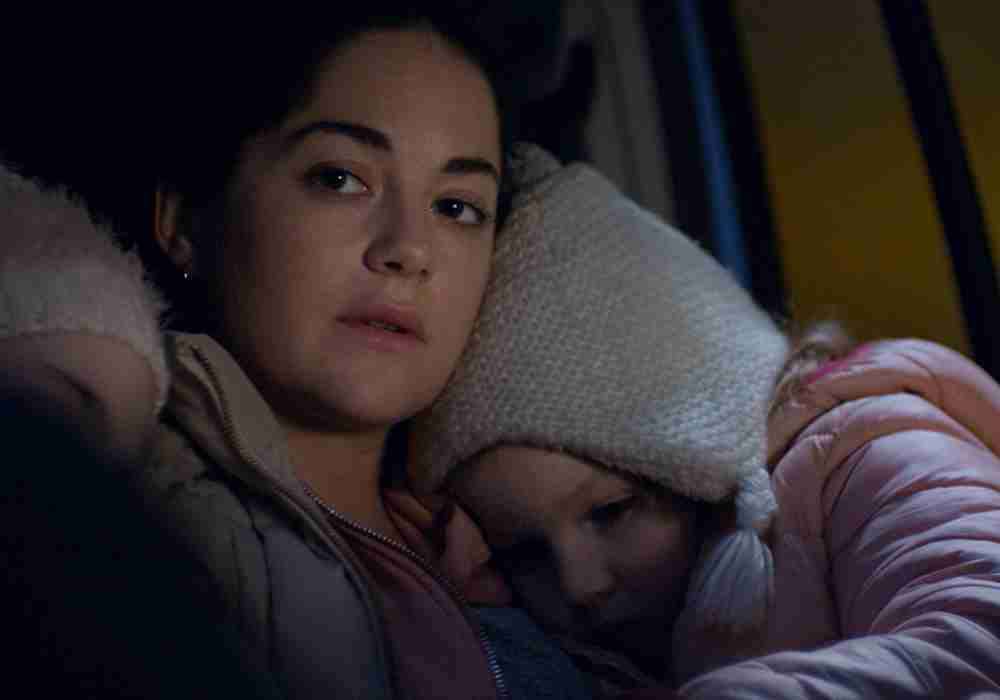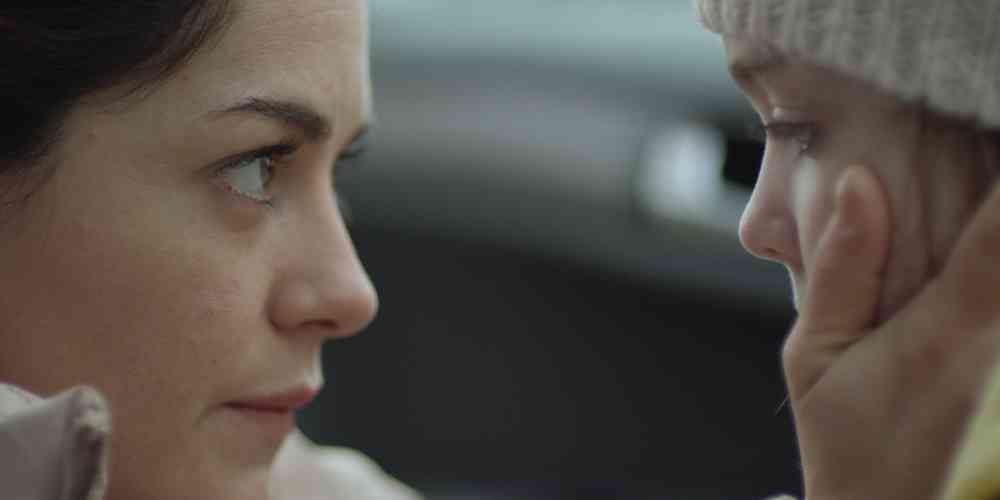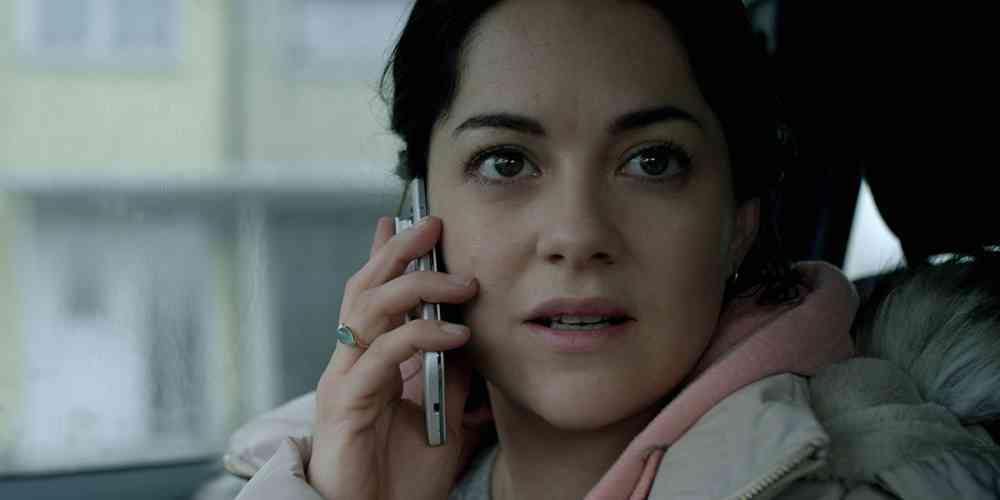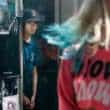Director Paddy Breathnach on Rosie, building the characters and family dynamic in a film that makes the political personal, and crafting an immediate, engaging visual style. Read all our TIFF coverage here.

Paddy Breathnach’s Rosie is as timely as they come, directly tackling the Dublin housing crisis, which is still a huge problem. The film’s politically urgent look at working class life recalls I, Daniel Blake — although it has even more in common with the Dardenne brothers’ Two Days, One Night. Not only does Breathnach’s style recall the Dardennes’, but both films follow a resilient woman continually asking for help that she desperately needs and facing the despair of continual rejection.
Over a roughly 24-hour period, we stay laser-focused on the eponymous Rosie (Sarah Greene), a mother of four who is scrambling to find temporary accommodation for her family. Her husband works through the day, leaving her to juggle the school run and search for a place to stay for the night, with no time for the family to find anywhere more permanent. They’ve found themselves thrown from a stable, happy life into an impossible situation.
Breathnach allows us to understand the systemic problems and bureaucracy that affect real lives without becoming didactic. Tellingly, Rosie begins with a newscast voiceover that describes the housing crisis in a distanced, politicised way — before that sound fades away and is replaced with the voice of Rosie. Following her singular perspective and emotions makes the issues that the film tackles more digestible and relatable than a relaying of anonymous facts and figures.
I talked to Breathnach about developing a protagonist and family dynamic that feel real and relatable, expanding the initial script with screenwriter Roddy Doyle, and developing an aesthetic that allows us to live in the moment with the characters.
Seventh Row (7R): What was the genesis of the project?
Paddy Breathnach: It started with [screenwriter] Roddy Doyle. He heard an item on the radio where a woman was talking about how she’d been homeless for a number of weeks. She couldn’t find a permanent place. She was having to find a hotel each night to live in, and she couldn’t get any help from her husband because he was working in the day. That seemed like such an anachronism, going against everything that we would think: a family with an income, with stability in lots of ways, finding themselves in this margin life position.
The production company sent the script to me. It was on the shorter side, but it was very pure and simple. That appealed to me a lot. Immediately, I felt there was a truth in its simplicity. It wasn’t polemic about the subject. I don’t think I could do a polemic well.
7R: What research went into the film as you were developing the script? Did you talk to real people who had been in this situation?
Paddy Breathnach: Roddy wrote it fairly quickly. It’s about a family and the details of family life. They’re trying to preserve a normality — doing homework, getting lunches ready for school, collecting from school — but it keeps getting shaken up. I think a lot of the initial research came from Roddy’s own life as a parent, knowing the reality and the tensions that surround that.
Once we had the script, we started the research and sort of reverse engineered it. We authenticated it, added the details, embellished and developed it. We met people who were in that situation and also talked to a lot of homeless charities about the mechanics of how the system works. If you are looking for emergency accommodation, how does your day pan out? What happens if you can’t get a hotel?
These people’s stories gave me the picture that any small complication in their life could have massive repercussions. Like if you didn’t get on with your mother, or you didn’t get on with your stepfather. One family had pets, and they couldn’t find a place to bring their pets. By the time their lease had run out, they hadn’t found a place for the pets, so the pets had to go into kennels, and the family still hadn’t found a place. Maybe they would have found a place if they’d looked initially. Sometimes, it’s a small complication that trips one family up.
7R: The family dynamic between Rosie, her husband, and her four children is so realistic and natural. How did you build that dynamic with them?
Paddy Breathnach: It starts in the casting. You’re trying to find a family that will work together.
Once it was cast, it was just about them getting to know each other, playing games, doing trust exercises, being silly. We were getting the children to feel very comfortable with everyone in the room and letting everyone be a bit silly and physically free.
I didn’t over-rehearse any of the scenes with the children. I might have read one or two scenes with them, but I didn’t push that. It was more about creating a mood and a tone — trying to make them feel at ease.
I was very worried about that with the children, because there’s such restrictions with the labour laws, rightly so. You can’t have children for a very long time on set. So the smart way to shoot it would be to do a wide shot and then punch in for a close-up of each particular character so that you can stagger them and never have them all there at the same time. But that’s a very boring and uninteresting method that doesn’t capture the atmosphere of them being with each other. I wanted to shoot in a way where we were evolving masters: we would shoot a master, and then reshoot it with a different start, so that each take would have something different and let you get your coverage quickly.

7R: The whole film rests on Sarah Greene’s shoulders, and she gives an absolutely brilliant performance. How did you cast her, and what were you looking for in an actress for this role?
Paddy Breathnach: Her name was there from the start. She was one of the people that we were considering. But I wanted to go quite wide for auditions and see a lot of people. I didn’t get her to audition until late on.
The audition process, for me, is where you’re beginning to refine the film tonally. You see what people do, and you think, “If I go with this person, it’ll mean this, and if I go with that person, it’ll mean that.” The film starts living a little bit in those audition tapes, as it’s the first moment where you can react beyond the script.
[click_to_tweet tweet=”‘We would shoot a master, and then reshoot it with a different start, so that each take would have something different and let you get your coverage quickly.'” quote=”‘We would shoot a master, and then reshoot it with a different start, so that each take would have something different and let you get your coverage quickly.'”]
I was looking for a mix of strength and vulnerability — something tenacious and confident, but somewhere in the back, a brittleness. She’d felt a shame when she was young — failing at school, possibly having been abused at home — that she’d managed to overcome to get a really good partner, have great kids, and have built a happy life for herself. And then, after all that work, that good life has been brought back into jeopardy.
I also wanted to get that here’s a young woman who’s a bit vivacious. There’s a wistfulness there, when she says, “They look brilliant don’t they” [at a group of young people dressed up for a Lady Gaga concert]. She is a young working class woman who should and could be having fun at the moment and could be having a normal life.
There were some really good actresses who auditioned and there were some fantastic auditions, but Sarah had something else: a precision and a sharpness about that line between vulnerability, brittleness, and strength.
7R: The sound design is really striking and brings us into Rosie’s subjectivity. How did you approach sound design in the film?
Paddy Breathnach: I had a really good editor, Úna Ní Dhonghaíle. The opening scene [where Rosie makes phone calls in the car, trying to find a hotel] is where a lot of the repetition of language happens: “I’m looking for a hotel,” “There’s just 6 of us,” “Just for a night,” “Dublin City credit card.”
But we found it very difficult to get into Rosie: you needed to understand her predicament of trying to make those phone calls when the kids are loud in the background. But I’d have to keep the kids down in the mix in order to establish that language, or else you wouldn’t be able to hear it. It wasn’t quite working. Una came up with the idea of establishing the language over the opening titles. You establish the language in the pre-credits so you don’t need to hear it in the car afterwards — everyone’s heard it before. Then I could crash harder to the kids.
I also learned from making Viva in Cuba: Havana is really loud and raw and noisy. When we came to edit Viva, there wasn’t loads of money to clean up the sound mix. Equally, when we tried to clean it up, it didn’t feel real or natural. It felt manipulated, and it went against this whole thing of trying to find the visceral presence of a city like Havana. So we began to say, “No, use rawness. Let there be raucous and hard cuts and let us keep some of the stuff you often try to clean up in a sound mix.”
I brought a bit of that into Rosie, being a bit aggressive with pushing the sound. I would try to keep as much of the reality in it as possible, and not worry if there were sirens going off or if there were things that normally might get cleaned up. I’d use the energy from them.

7R: Did you shoot the film chronologically?
Paddy Breathnach: Fairly chronologically. Not absolutely because it’s a low budget film.
I got an initial schedule and it was very much broken down to work around the kids’ availability. It was very fragmented. I hadn’t worked with children for a long time, so for a bit, I took it as a given that I’d have to go with this because it’s the law of working with kids and there’s no other way of doing it. But it was irking me. I knew I wasn’t going to get what I wanted for the film. It’ll be a film, but it’s not the film that I want to do.
So when the first AD came on board, I asked her to redo the schedule and to make it friendly to the story. She did a great schedule: it wasn’t completely chronological but it was heading in that direction. It let the thing breathe a bit and let it have some sort of natural development.
7R: How did you collaborate with your cinematographer to devise the aesthetic of the film?
Paddy Breathnach: Cathal Watters shot it. I made worked with him previously on Viva. When we were doing that film, we developed a style between ourselves, what I would call ‘evolving masters’. You master a scene and then make subtle changes to it and develop it, so the scene always feels like it’s developing. You start on a master and with each take, what you follow changes. It starts somewhere and then it develops and follows somebody else.
Cathal trained as an actor himself and is really brilliant at reading when an actor is going to move. You can let the actor have a bit more freedom to go where they might go and not tie themselves down completely.
We also set certain rules. For example, we’re never going to look in the windows at them except for in the first shot and the last three shots of the film. Otherwise, we never observed them from outside. It’s naturalism, but its not a dispassionate, observed documentary style. It’s a kinetic one where you’re very present with them all the time. We’re always using medium close-ups or travelling shots or point of view shots that develop into someone moving into their own POV or out of their own POV. These rules establish a coherent aesthetic that brings a feeling of imminence and a feeling of some relation between the camera and Rosie.
Naturalism sometimes goes against finding a poetic style, but I think that style does let you find some poetry within it. That’s what we tried to do: find little moments of poetry with a small ‘P’.
We talked a lot about setting the parameters. We decided things, like condensation was going to play a role in the film. There’s also colours like blue where I want you to get a sense of a rising blue the whole time. At the end, there’s this sort of blue ceiling above them like they’ve been submerged. Yellow is a colour of shame in the film so I use yellow in very specific moments to talk about a narrative of shame. I don’t want people to read these things or say, “That means that.” But from a filmmakers’ point of view, we use them as ways to navigate a narrative structure. We had this toolkit of things that we’d established, a mixture of tools and rules.
The other thing is using long takes that evolve. It’s not all the way through the film, but in key moments, we used longer takes so we can stay with the characters in a greater way. The long take [where Rosie is frantically looking for her daughter Kayleigh] was one of those points where we use a long take to stay with her on this journey and be with her.
The version of that scene that’s in the film, [where Rosie and her children go into the garden of their old house], wasn’t in the original script. The plot of the scene didn’t change at all, but I felt there were moments that could be expanded. The script said, “They pass by their old house,” so I said, “Why don’t they go into the house? Why doesn’t the son goes into the back garden and play with his toys or something?” Then Roddy takes that and makes it into a trampoline. What can they do with a trampoline? They can’t take it out, they can’t take it with them. It’s a present that kids love. When they get a trampoline it’s a big deal. Kids spend so much time on it.
We were trying to find ways to be with them a lot more. That goes into the aesthetic. I want to be with her in a certain way, like on her shoulder: there’s a certain shot where you’re moving with her, and I call it the ‘destiny shot’. You’re moving toward some sort of destiny and you’re playing on that.
7R: Why did you decide to break your rules at the beginning and the end by looking through a window?
Paddy Breathnach: It was a way of entering into their lives at the beginning. We got to a certain stage where we decided we wanted to be in the car with them all the time. To make that felt, you have to have a moment or two where you’re outside that, so you can emphasise it by having that change. At the very beginning of the film, starting on the outside of the car allows us to crash into the scene where we’re inside the car and the kids are very loud all of a sudden. You have this apparent gentle introduction, which is suddenly pulled away, and you’re thrown into her predicament.
At the end of the film, there’s a sense that something has changed when they get to that car park. They have dropped down a level. Their world is no longer taken for granted. There is a bit of distance between us and them at the end of the film because there’s an ambiguity that’s come into it.
I think there’s something about those last shots that’s almost like something out of a fairytale, with those three kids in the back of the car like the babes in the wood. We’re no longer quite with them; we’re observing them. In a sense, Rosie is beginning to observe them herself. She’s slightly distanced from it because she begins to be aware that their reality is no longer a given. Because she’s a smart woman, she knows intuitively that she can’t take their family life for granted anymore. Her ability to keep her family together has taken a huge dent. It’s like a floor has collapsed below them, and they’ve gone down one level.
Read all our TIFF coverage here >>
Rosie has invited many comparisons to Ken Loach’s I, Daniel Blake, which Gillie Collins found to be politically stirring but problematic in how Daniel Blake is depicted as the Deserving Poor. We’ve covered other films that successfully tackle political issues by staying character-focused: BPM follows the lives of AIDS activists who were part of Act Up Paris in the ‘90s; Falls Around Her places the fight for Indigenous people’s right to land in parallel to its protagonist’s personal problems; The Florida Project is a lively and empathetic look at the ‘hidden homeless’ living just outside Disney World.

